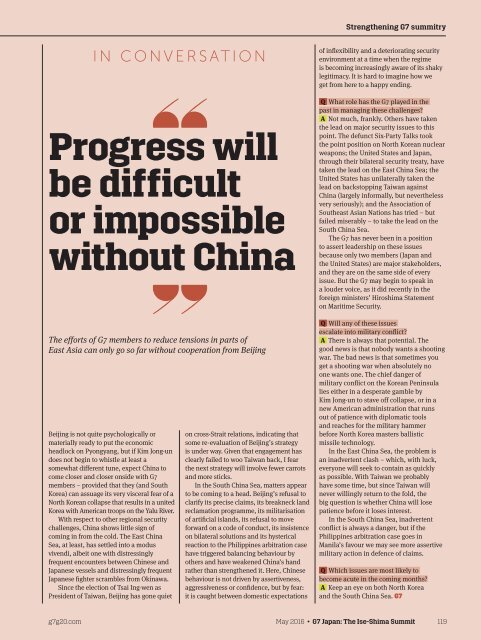G7_JAPAN
Create successful ePaper yourself
Turn your PDF publications into a flip-book with our unique Google optimized e-Paper software.
Strengthening <strong>G7</strong> summitry<br />
IN CONVERSATION<br />
Progress will<br />
be difficult<br />
or impossible<br />
without China<br />
The efforts of <strong>G7</strong> members to reduce tensions in parts of<br />
East Asia can only go so far without cooperation from Beijing<br />
Beijing is not quite psychologically or<br />
materially ready to put the economic<br />
headlock on Pyongyang, but if Kim Jong-un<br />
does not begin to whistle at least a<br />
somewhat different tune, expect China to<br />
come closer and closer onside with <strong>G7</strong><br />
members – provided that they (and South<br />
Korea) can assuage its very visceral fear of a<br />
North Korean collapse that results in a united<br />
Korea with American troops on the Yalu River.<br />
With respect to other regional security<br />
challenges, China shows little sign of<br />
coming in from the cold. The East China<br />
Sea, at least, has settled into a modus<br />
vivendi, albeit one with distressingly<br />
frequent encounters between Chinese and<br />
Japanese vessels and distressingly frequent<br />
Japanese fighter scrambles from Okinawa.<br />
Since the election of Tsai Ing-wen as<br />
President of Taiwan, Beijing has gone quiet<br />
on cross-Strait relations, indicating that<br />
some re-evaluation of Beijing’s strategy<br />
is under way. Given that engagement has<br />
clearly failed to woo Taiwan back, I fear<br />
the next strategy will involve fewer carrots<br />
and more sticks.<br />
In the South China Sea, matters appear<br />
to be coming to a head. Beijing’s refusal to<br />
clarify its precise claims, its breakneck land<br />
reclamation programme, its militarisation<br />
of artificial islands, its refusal to move<br />
forward on a code of conduct, its insistence<br />
on bilateral solutions and its hysterical<br />
reaction to the Philippines arbitration case<br />
have triggered balancing behaviour by<br />
others and have weakened China’s hand<br />
rather than strengthened it. Here, Chinese<br />
behaviour is not driven by assertiveness,<br />
aggressiveness or confidence, but by fear:<br />
it is caught between domestic expectations<br />
of inflexibility and a deteriorating security<br />
environment at a time when the regime<br />
is becoming increasingly aware of its shaky<br />
legitimacy. It is hard to imagine how we<br />
get from here to a happy ending.<br />
Q What role has the <strong>G7</strong> played in the<br />
past in managing these challenges?<br />
A Not much, frankly. Others have taken<br />
the lead on major security issues to this<br />
point. The defunct Six-Party Talks took<br />
the point position on North Korean nuclear<br />
weapons; the United States and Japan,<br />
through their bilateral security treaty, have<br />
taken the lead on the East China Sea; the<br />
United States has unilaterally taken the<br />
lead on backstopping Taiwan against<br />
China (largely informally, but nevertheless<br />
very seriously); and the Association of<br />
Southeast Asian Nations has tried – but<br />
failed miserably – to take the lead on the<br />
South China Sea.<br />
The <strong>G7</strong> has never been in a position<br />
to assert leadership on these issues<br />
because only two members (Japan and<br />
the United States) are major stakeholders,<br />
and they are on the same side of every<br />
issue. But the <strong>G7</strong> may begin to speak in<br />
a louder voice, as it did recently in the<br />
foreign ministers’ Hiroshima Statement<br />
on Maritime Security.<br />
Q Will any of these issues<br />
escalate into military conflict?<br />
A There is always that potential. The<br />
good news is that nobody wants a shooting<br />
war. The bad news is that sometimes you<br />
get a shooting war when absolutely no<br />
one wants one. The chief danger of<br />
military conflict on the Korean Peninsula<br />
lies either in a desperate gamble by<br />
Kim Jong-un to stave off collapse, or in a<br />
new American administration that runs<br />
out of patience with diplomatic tools<br />
and reaches for the military hammer<br />
before North Korea masters ballistic<br />
missile technology.<br />
In the East China Sea, the problem is<br />
an inadvertent clash – which, with luck,<br />
everyone will seek to contain as quickly<br />
as possible. With Taiwan we probably<br />
have some time, but since Taiwan will<br />
never willingly return to the fold, the<br />
big question is whether China will lose<br />
patience before it loses interest.<br />
In the South China Sea, inadvertent<br />
conflict is always a danger, but if the<br />
Philippines arbitration case goes in<br />
Manila’s favour we may see more assertive<br />
military action in defence of claims.<br />
Q Which issues are most likely to<br />
become acute in the coming months?<br />
A Keep an eye on both North Korea<br />
and the South China Sea. <strong>G7</strong><br />
g7g20.com May 2016 • <strong>G7</strong> Japan: The Ise-Shima Summit 119
















